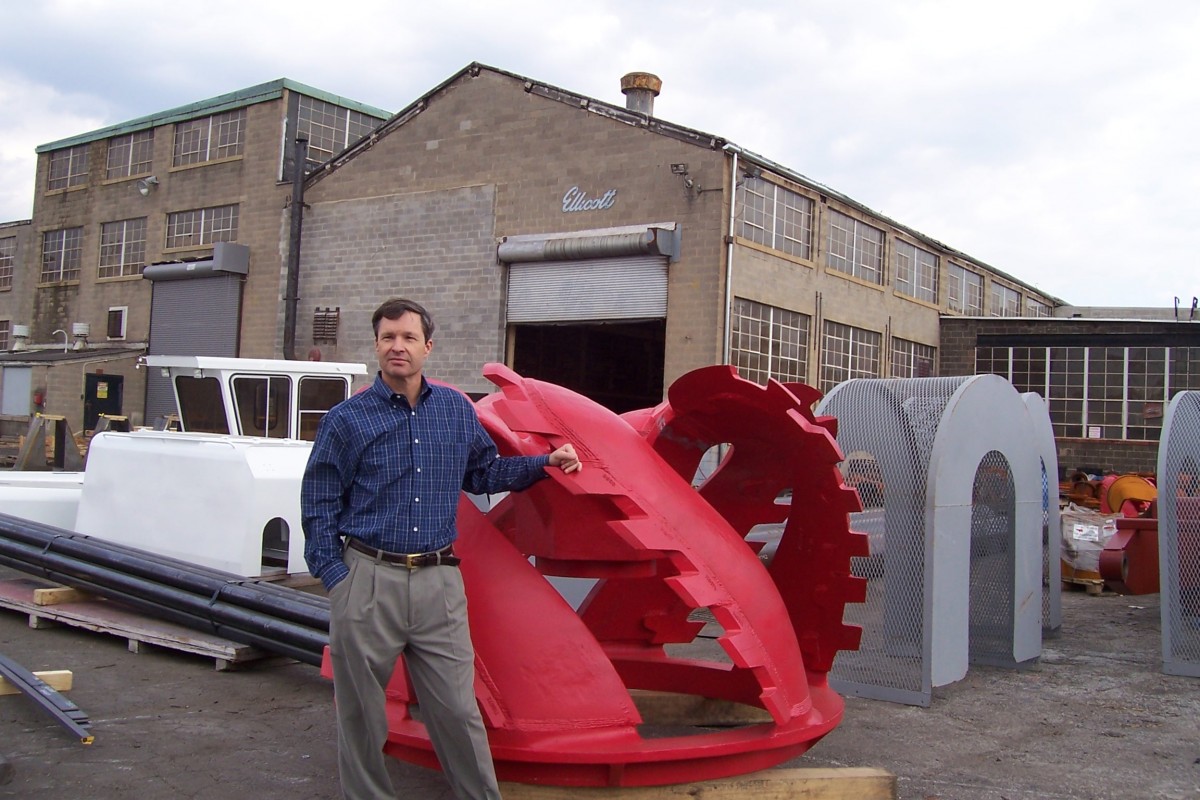Keystone XL To Be a Boon for U.S. Manufacturing
The debate surrounding the building of a 1,179-mile, 36-inch-diameter pipeline that would deliver crude oil from Canada’s oil sands to the U.S. Gulf Coast has been long and contentious, to say the least. It’s been some five years since an extension to the existing Keystone pipeline—which currently runs from Alberta, Canada to Cushing, Oklahoma—was proposed and, in that time, it has become one of the most scrutinized and controversial pipeline projects in U.S. history.

The debate surrounding the building of a 1,179-mile, 36-inch-diameter pipeline that would deliver crude oil from Canada’s oil sands to the U.S. Gulf Coast has been long and contentious, to say the least. It’s been some five years since an extension to the existing Keystone pipeline—which currently runs from Alberta, Canada to Cushing, Oklahoma—was proposed and, in that time, it has become one of the most scrutinized and controversial pipeline projects in U.S. history.
The U.S. State Department released its long-awaited final environmental impact statement (EIS) in January, and the president’s decision to approve or reject the pipeline proposal was expected to hinge on the results of this study. But the Obama administration recently announced the decision would be delayed yet again, following a state district court’s decision to invalidate the proposed Nebraska route. The administration said no decision will be made until this route is clarified and agencies have been given a comment period, but, in an election year, many are speculating that this delay is politically motivated.
Americans across the nation, representing a wide variety of business, industry, environmental and other special interest groups, have weighed in on the debate, and manufacturers are no exception.
In October of last year, 165 multi-faceted business and industry leaders, including manufacturers, issued a letter to President Obama, urging approval of the project. The letter noted, “We are at an inflection point in our economic recovery. Whether economic growth will remain modest or pick up speed will depend on maintaining investor confidence and strengthening America’s competitiveness. The decision on Keystone XL will affect both.”
But why are these leaders so convinced Keystone will be a long-term boon to U.S. manufacturing and the overall economy? The answer may lie in simple economics. Watch this recent video from the National Association of Manufacturers (NAM):
Few have doubted that Keystone will have a positive impact on U.S. job growth and the overall economy, but debate continues over how long these benefits will be sustained once the pipeline becomes operational. TransCanada, the pipeline company that owns Keystone, and its supporters say the economic benefit would be long-lasting, while opponents contend most of the impact will be felt during the construction phase, and the jobs created would largely be temporary.
The final EIS from the State Department estimated that, during the construction phase alone, the project would support over 42,000 direct and indirect jobs nationwide, equaling over $2 billion in earnings. Additionally, the project would contribute approximately $3.4 billion to the U.S. gross domestic product.
And while many of the jobs created on the construction side are temporary by nature, other industries in the pipeline’s supply chain will create long-term jobs, especially in manufacturing. Some economists estimate the pipeline would create 20,000 manufacturing and construction jobs, and tens-of-thousands additional spin-off jobs within this supply chain.
“We’re talking about thousands of more jobs from the pipe being manufactured,” said Davis Sheremata, spokesperson for TransCanada. “There is pipe being made in Arkansas, pump motors in Ohio, transformers in Pennsylvania—we have workers in almost every state in the nation benefitting from this.”
“These workers are going to be paid very well, and do things like put their kids through school, pay their mortgages, put money towards their pensions and their retirement, and save for a rainy day,” he said.
Peter Bowe is president of Ellicott Dredges, LLC, a Baltimore-based manufacturer that makes equipment used in reclamation of tailing ponds from oil sands production in Canada. In May of last year, Bowe testified in front of Congress—along with several other manufacturers—in support of Keystone.
 Peter Bowe, President of Ellicott Dredges, at the company’s Baltimore manufacturing facility
Peter Bowe, President of Ellicott Dredges, at the company’s Baltimore manufacturing facility
In his testimony, Bowe stated, “For us, it’s all about jobs—not construction jobs for the pipeline itself, but ongoing jobs, every year for decades to come, all related to the production of oil from the Alberta oil sands deposits. This oil needs the Keystone pipeline.”
Bowe says if Keystone is not approved, the distribution barrier will result in lower prices per barrel of oil, creating price pressures for vendors throughout the Canadian oil sands supply chain.
“The fact is the Keystone pipeline is an off-take of the oil sands product that is necessary to deliver it to market, and anything which makes their job of production and distribution easier is good for their supply chain, of which we are a part,” said Bowe. “So, the lack of Keystone is a temporary obstacle to the distribution of oil.”
“You can look it up and see that folks there are getting, in some cases, $20 to $40 less per barrel than the market price,” said Bowe. “And, the principal reason for this is not that the oil is any different, it’s because of the obstacles in the transportation process. So, until those obstacles are resolved, the producers are going to have pricing problems.”
Manufacturers have also been deeply involved in the debate over U.S. energy independence, and whether or not Keystone oil will ultimately be utilized as an energy source in the U.S., or be exported overseas.
While TransCanada and its supporters maintain the oil delivered by Keystone will largely be utilized by U.S. refineries and petrochemical manufacturers, opponents believe transporting it to the Gulf Coast can only mean one thing: exportation to foreign countries. Specifically, critics have asserted that Keystone oil will ultimately end up in China, given the significant investment the Chinese government has made in Canadian oil sands companies in recent years. Some have estimated this investment to be over $30 billion.
According to the U.S. Energy Information Administration (EIA), the U.S. is the largest oil consumer in the world, importing approximately 10.6 million barrels of petroleum per day from about 80 countries.
“Both the International Energy Agency and the EIA are forecasting that the U.S. is going to continue to be a net importer of oil through 2040, and will need to import between 4 and 6 million barrels a day to meet our energy demand,” said Sheremata. “Keystone will help meet part of that demand.”
Sheremata contends the business model of exporting Canadian oil overseas—only to import it back to the U.S.—simply doesn’t make sense.
“Given market conditions and the fact that you are getting an inexpensive crude to use as feedstock to refine and to turn into the domestic market makes much more fiscal sense than to export the raw material,” explained Sheremata. “So what we’re hearing is that the export option is very unlikely to be economically justified for a lengthy period of time, given transport costs and market conditions. It’s unlikely that very much, if any, of this oil will be exported.”
Bowe agrees and believes that the market will ultimately determine where oil from Keystone ends up.
“As a manufacturer, I want more energy available in the States, and that will tend to reduce prices which will be good for us,” he said. “So, even if the oil ends up going to China, that would mean that the market price is such that it’s worthwhile for them to ship it and pay for that cost all the way over there—it’s still displacing some other source of supply. (Oil from Keystone) should be allowed to move freely. If it makes sense to come to the States, it will.”
In February, Bowe co-authored an Op-Ed in Forbes magazine in support of the pipeline, concluding, “The Keystone XL pipeline represents a lifeline for American workers and the U.S. economy, and the longer we wait for approval, the longer the creation of thousands of high-paying manufacturing jobs for American workers is put on hold. Our companies and employees are ready to go to work tomorrow to support the Keystone pipeline. It is time for President Obama to accept the facts and approve the project.”
 Eric Spiegel, CEO of Siemens Corporation USA
Eric Spiegel, CEO of Siemens Corporation USA
Bowe is just one of countless business and industry leaders who have publicly supported approval of Keystone XL. Eric Spiegel, CEO of industrial and engineering giant Siemens Corporation USA, has also made his support known.
“As the U.S. works to develop a comprehensive energy and environmental policy that addresses climate concerns, ensures adequate supplies of reliable energy, promotes energy independence and improves our national security, the Keystone XL project can be an important piece in moving this country forward,” he said.
- Category:
- GrayWay
Some opinions expressed in this article may be those of a contributing author and not necessarily Gray.
Related News & Insights
Food & Beverage
Gray Project Receives Manufacturing Innovation Award
Corporate News, Industry
December 04, 2024NexGen Spotlight: In Pursuit of Excellence
Stories
Advanced Technology, Automation & Controls
Four Use Cases for AI's Growing Role in Manufacturing
Industry
November 25, 2024